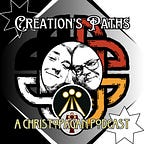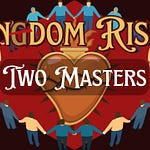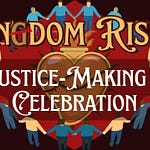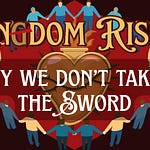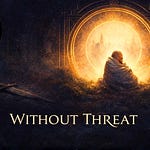In this episode of 'Creation's Paths,' Charlie, a non-binary sci-fi fantasy writer, and their husband Brian explore the esoteric aspects of early Christianity and Christopaganism. They delve into the complex historical context of the first to third centuries, discussing the influence of hekhalot and merkava mysticism on early Christian thought. The episode covers the forgotten origins of Christianity, the role of mysticism in early Jewish and Christian traditions. Key topics include the chaos of the first century, the diverse Jewish sects at the time, and the mystic traditions like the vision of Ezekiel and the book of Enoch. The episode also touches on the influence of the apostle Paul and the early Christian schisms between Gnostics and proto-Orthodox beliefs. Join the discussion to gain a deeper understanding of the hidden historical and mystical roots of Christianity.
Support us on: https://ko-fi.com/cedorsett
Become a patron of the arts patreon.com/cedorsett
For Educational Resource: Wisdoms Cry https://wisdomscry.com
For all of the things we are doing at The Seraphic Grove go to Creation's Paths https://www.creationspaths.com/
BlueSky https://bsky.app/profile/creationspaths.com
Threads https://www.threads.net/@creationspaths
Instagram https://www.instagram.com/creationspaths/
Transcript:
Charlie- New: [00:00:00] Hello and welcome to this episode of creation's paths. Today, we're going to talk about something a little bit more esoteric something a little bit deeper. We're going to look at the question who shall ascend and who has descended and why this is important for us to understand the history origins and potential future of Christianity and Christopaganism.
Intro .
Hello everyone. My name is Charlie. I am a non-binary scifi fantasy writer, and I am joined today by my wonderful husband, Brian.
Brian - New: Hello.
Charlie- New: Today we're going to be talking about something a little bit. Like I said in the intro esoteric. I don't want anybody to get worried. I am not expecting people to be a master of hekhalot [00:01:00] mysticism or merkava mysticism, or to even know what either of those two words I just said, meant. It's important though that we understand this because. The origins of Christianity have been. . Swept under the rug. So obscured. By an Imperial tradition that came along later. We have forgotten where it actually came from. And the arguments that were actually happening. In the first century. Well, I guess the first five centuries, but really for our sake here, we're talking about the first one to three centuries. Of the church.
This colors, everything. It goes to the question of who is Jesus. It goes to the question of what is the kingdom. It goes into the question of. What. Is the work of somebody on the way.
It also will probably help you understand. who the apostle Paul is and why Paul converted to Christianity. Without ever having met Jesus. [00:02:00] Because we. Like to play. Dumb about the first century. I don't mean that to be insulting. I mean, that, to be. Self-preserving. First century. Of the common era. Was chaotic in ways that it is really hard to get your mind around.
Rome was doing all of the many things that Rome was doing. Which goes everywhere from the good, the bad to the extremely ugly and grotesque.
When we go into the Lavant, when we go into the land of Judea and Galilee, one, most people don't even realize those are two separate countries for. Lack of a better term terms. The Galilee and Judea had different rulers and different leadership.
They were both under Rome. That's why in the crucifixion narratives, punches, pilot, who was in charge of Judea. sends. Jesus too. Herod. Because Herod was the king over the Galilee.
Okay. It's all getting over [00:03:00] complex. And that's why we don't think about it. We don't want to think about it. We like to think Jesus was the only miracle working. prophet in the first century. He was not, I'm not going to go down the long list of them. But there was a long list of them. He was not even the only person. Who claimed or was believed to be the Jewish Messiah in the first century, he was not, there were several of them. In fact, the Talmud goes through and says a lot about a lot of these people.
First century. Was a complex time of upheaval and change. Because the Roman empire. Was just coming into being, we like to think of the Roman empire as something that is ancient and to us. Yes. At the time. The Roman Republic had just fallen.
See Julius Caesar had been killed, not that long ago in our narrative and Augustus. Was the first real Roman emperor. So when you open the gospels and you see this. The time of Caesar [00:04:00] Augustus.
This is a time of great turmoil, the Republic, the democratic Republic for whatever the word democratic. Fits into the way the Romans did things . The democratic Republic had fallen and was being replaced by this new Imperial state. That would go on for. A long time. At least a thousand years to the follow-up of. Byzantium. In Constantinople. It went on for quite some time. But everything's been reordered. And so there is a lot of chaos. Not only is there a lot of chaos, but because. Judea had not been conquered for that long. There's a lot going on with, in. The meilu of first century Judaism. I'm not going to go into all of the different aspects of it, but you can see this preserved in the gospels themselves, where Jesus is talking about four distinct se Of Jews that were alive at the time. You have the Pharisees, the Sadducees, the scribes. Which there's a lot of [00:05:00] contention over.
Exactly. Who he's referring to as describes that could actually refer to several groups or several groups that are being lumped together into one category and the priests. And we know who the priests are.
He's talking about four groups just in the gospels, at minimum. And that's not all of them. There were a lot more, in fact, amongst his. Disciples. We have. One who is referred to as a zealot. Now, this was a completely different sect of Judaism that existed in the first century. That was neither a He has scriber priest. So now we're up to five, just within the confines of the new Testament. Just what's in the gospels.
So needless to say, this is a very complex time.
Out of this new nascent religion gets started. Which initially called itself the way and that we now know as crazy as Christianity.
But what were they doing? What was going on here?
I and a lot of other folk.
[00:06:00] Tend to believe that Jesus and the apostles. We're. Participating in what was known as either. hekhalot mysticism. Or merkava mysticism. Now these two words are virtually interchangeable. They're not interchangeable, but there's a lot of overlap. And confusion where many texts. Have both in them. So let's go to English for a second. hekhalot means palaces. Merkava means charity.
Starting at about the third century, fifth to third century before the common era. A fascination was born in to the idea of how we're profits profits.
The last prophet that we have recorded. In scriptures, Malakai and Malakai. That's fifth century. Before the common era. And then the profits are gone.
They're just gone. Despite what many of us might be thinking. well, God just got quiet. the old Testament talks about schools of profits.
They taught each other. They [00:07:00] learned things. Well, if there's a school, then it's something you can learn. So the idea is these lessons got lost and people started looking for them. Mystics started happening. Various people started trying to, connect to God in various ways. And an obsession grew. Around the vision of Ezekiel. Where he sees. So much. He sees the four living creatures.
He sees the ophanim that are often referred to as biblically, accurate angels, even though. There's a good argument that they're not even angels.
Brian - New: Deep topic. Yeah.
Charlie- New: I get really upset when I see biblically accurate angels and they show a picture of a ophanim. Because the ophanim. There. The wheels. And I often sit mispronounced that word and I apologize. It's ophanim wheels. I often. Get my consonant mixed up in there.
So. I apologize if I say it wrong.
The wheels. Are not necessarily angels they're spirits, [00:08:00] but it's all fun.
What people started wondering. Is whether or not you could decode. All aspects of this. And find a way to reconnect to God. And get that wisdom back that prophecy back that connection to the divine back. This is the start of Merkava mysticism. The difference between Merkava mysticism and hekhalot mysticism. Again, this is a gross oversimplification. Is in Merkava they focused on the divine chariot. That is mentioned in this vision. In hekhalot hekhalot means the palaces. Saint Teresa of Avila is interior castle. You're going through the various rooms of the palaces of heaven. Rather than. The various rooms that are within the chair.
Gross simplification. There you go.
Now most people who are familiar with this at all. Are familiar with it in the book of Enoch. Enoch is a work of hekhalot literature, especially 30. 30. Enoch is. [00:09:00] Straight up Merkava mysticism. Writ large. But most of that Enochian tradition of the first several centuries. So first, second and 30 Enoch high to fit within here.
You see echoes of it in here. The whole point of this is the descenders. They often referred to themselves as descending, rather than ascending.
One of these days, we'll probably do a deeper dive into this. If you want more, Justin sledge over at esoterica. Has a wonderful episode called the, , esoteric origin of Christianity. Where he goes into a lot of this. He's also got quite a few deep dives into the topic. I'm trying to be as simple as I can.
And I'm already halfway through the podcast and I'm still doing introductions.
Brian - New: Yeah. It's a big topic. People will spend entire lifetimes studying it. Trying to do the cliff notes version would probably take a year of study. The cliff note of the cliff notes is like maybe a couple hours long. Several of Justins episodes are several hours. Dives into it just to get the cliff notes of the cliff notes. .
Charlie- New: Suffice it to [00:10:00] say. The mysticism that arose.
Had a couple key aspects to it. You're rising up through the heavens. There are angels all over the place. And there are passwords. That you have to give. Various things that you have to be able to say and answer. To get past each guardian at each stage to, to ascend.
What's really remarkable and of note here. Is how much this looks like early Christianity.
And how much early Christianity. Is struggling in this milieu.
The apostle Paul. Very clearly. Uses a lot of phrases that are terms from. mysticism in his theology. He very clearly was a practitioner. In fact, when he tells his story about. Rising up into the third heaven where he sees Jesus. Now, this is a big thing here. The third heaven. Is one of the. Depending on which system you employ. Middle to high tier [00:11:00] heavens. The number of heavens varies in the system of practice, but. The third heaven in most of these. Is the paradise.
This is the garden of Eden. This is where you're first starting to see the perfection of all things. So he's called up into the third heaven. He sees Jesus.
And he uses a lot of merkava language here.
Now why am I. Struggling on this. Because this is core to everything within Christianity. And I think where people get lost. Because we've lost this connection to our Jewish roots. They were forcibly cut off and the third. To fifth century. So we don't have this context anymore. So much of Christian theology.
Is rooted. In this idea of a scent in decent. We have just talked about. The transfiguration. Where the apostles ascend the mountain. And see Jesus. At the top of the mountain. Talking to Moses and Elijah. This is very much in line with the [00:12:00] spirituality of the first several centuries that Judaism. And how it's being wrestled with in early Christianity.
We're about to talk about the assumption of Mary. Where Mary is going to be taken. Into heaven. This is a very old idea, by the way, don't let anybody trick you on this. Yes. It was only made dogma like official dogma of the Catholic church in the 17 hundreds, I believe 18th century. But the earliest recorded story of this comes from the third century. ,this is an idea that goes. Way back. In Christianity. Just because that's, when it was recorded, does not mean that was the first time it was discussed. It's just the oldest documentation. We have of this ideas from the third. Century.
But ascend. Decent. Who will ascend, who will decent.
This language keeps showing up. It's my contention. That Jesus. This is going to be a very controversial statement. It's hard to say it out loud. Jesus says to Merkava mysticism. What the Baal Shem Tov. [00:13:00] Was to Qabalah. he was popularizing it and opening it up.
Now, if you don't know who the Baal Shem Tov is, he is the founder of the Hasidic movement. He brought the ideas of Kabbalah. To the people. So that everyone could practice. And made it a very visceral personal experience.
You didn't have to go away. You didn't have to seclude yourself and go into all of the study. You still can. But certain aspects of it are now public they're suddenly for all of us to. Engage them. My contention is, this is what Jesus is doing. This is why he preached the gospel of the kingdom. This is how you access the heavens.
It's very simple. It's not this long. Drawn out process that takes years to master. You can just do it. He's teaching a very. Personal. Accessible form of this mysticism.
This is why. One of the earliest schisms we see in the church. It's between the Gnostics. [00:14:00] And the prodo Orthodox. Because the Gnostics. Are. Through a very Alexandrian lens. And that's Alexandra is in, uh, Alexandria, Egypt. Are taking in ideas from hermeticism. From previously existing sources, like the, book of Jeu. Which. Predates Christianity. And at least some of its ideas. Is trained to take this idea of the ascent into the heavens. And is laying it out in a Greek way.
In fact, we see this later in the new Testament with. Stop worrying about all your endless genealogies and mythologies.
We like to think that's about. Gnosticism. We don't see anything that we would call Gnostic that early.
We do see this merkava mysticism, which had these endless cycles of emanations from God, from. Paths and steps that you have to take to go. Up into the divine.
We see this being addressed, even in the gospels.
So earlier today I was talking to Brian [00:15:00] and we were talking about this passage. In John three. Now John three is very important because this is where John is laying out the gospel. Jesus is sitting and talking to Nicodemus. Macadamias. They're having their long thing. This is where the passage from this, you probably know because you've heard it so much. The John three 16. For God.
So loved the world that he gave. His only begotten son that whosoever believes in him shall not perish, but have everlasting life. Yeah, John three, this is also the passage where he says that people must be born again. That's where that language comes from, because this is the mission statement of John's gospel. He's laying out in this discourse between these Jesus and one. Potential disciple.
Who's. Thinking about joining hu, very importantly, as a member of the Sanhedrin. So a very prominent Jewish leader.
That's important for what we're about to talk about. And Jesus says something. Very specific here that to me, It's very much addressing this idea of merkava mysticism.
Brian - New: If I told you earthly things [00:16:00] and you don't believe, how will you believe if I tell you heavenly things? No one has ascended. Into heaven. But he who descended out of heaven, the son of man who is in heaven.
Charlie- New: Why would Jesus say that if you don't know. The. Environment in which Jesus is teaching here. This is a very weird statement to just be in the middle of this passage. He's already told us some crazy things. Like you have to be born again. You have to be born of water and fire. This is some very heavenly things, but now all of a sudden. No one has ascended into heaven. Except for he who is descended. Now, first of all, I think when we're studying the gospel of John. This is where we're looking at the teachings of the body of Christ. Not necessarily the historical Christ. John is the last of the gospels to be written of the canonical gospels to be written. And was written in about. 90 CE.
It's written after the fall of the [00:17:00] temple. Much of the gospel of John. Is this early Christian movement. Wrestling with its Jewish counterparts. In fact, some of the most anti-Semitic things. The, with the exception of the most antisemitic thing, which is in the gospel of Luke. We can talk about that. If you want, we can do an episode of antisemitism in the gospels because there's a lot of it.
But a lot of the antisemitic ideas. Come in here. Some of them are straight up. anti-Semitic such as you or the children of the devil.
No. And we need to be able to weed those ideas out. But this is also going directly at the Jewish community. The most popular form of mysticism at the time is this merkava mysticism where you are trying to ascend. Now, this shows that whoever wrote this passage was not familiar. They called themselves descenders.
They descended into the chariot. It did not ascend. Yeah. And ascend up into the chariot. again, this shows this misunderstanding. Of what's being talked about here. But this is directly going after [00:18:00] that.
No one has ascended. But the one who is decent.
This is what Jesus is trying to in this story, trying to change. And I think Rehmann connects back to what we see. Jesus in the other gospels talking about.
That we can have access to the divine. Without all of these passwords. And deep esoteric practices. And when I say deep esoteric practices, we're talking about sitting in a room and chanting for hours. If not days.
In hopes of maybe possibly having a vision.
Jesus is like, nah. You can just do it. It's fine. You don't have to go through all that. You don't have to do all the fasting. You don't have to do all, all that.
But why this focus on no one has ascended.
Who did not descend. The gospel of John is very clear that Jesus is the divine wisdom. Jesus is the logos that phylo of Alexandria. Well, there's that city again? Talked about. This. Living embodiment of Torah. That existed before the universe was made. Was there [00:19:00] with God when the universe was made. And. Helped in the creation of the universe. By the way, all things you can find in follow a valid Exandria completely without any Christian context whatsoever.
You also find it in several of the Aramaic targets that existed at the time. The person of Jesus in the gospels. And the character of what he's trying to do. It's to open up. Heaven.
Heaven. It's something that the Imperial. Church. Wants to control for itself. And before there was an Imperial church. There were those Grifters who just wanted to sell you a ticket to heaven. Without actually having one. Those Grifters have always been here. There have been those that are just like, no, you haven't experienced God because you haven't done all the right things yet. You're not holy, like the most holy.
The gospel. The actual good news. The Jesus taught. Was, you don't need any of that other stuff.
You can just talk to your father. And heaven.
We [00:20:00] either also get into the debate over whether. Abba means father, but. That's a debate for another time. Abbott could also mean source. It doesn't necessarily have a gender patriarchal meaning, but man. Aramaic. Cause if I'm.
But who shall ascend? No one has ascended except for the one was decent. This is the gospel of John. Trying to proclaim. Itself as unique in this tradition. Ignore all those other things.
The gospel of John is very big on trying to combat this prodo Gnosticism that's going around, which is this. Christianization of the merkava mysticism that was going around. With some of the. Aspects of the Greco-Roman magical system that was around at the time and kind of the. Hermetic system that was around at the time.
It's important for us. I know that seems very disjointed, but again, we're trying to make these like 30 minute episodes. And I'm trying to. Give a very big. Idea in a very short period of time. This is what's going on here. And it's important [00:21:00] because when we talk about the assumption of the blessed mother, And to have him or the Ascension of Jesus,
this is all connected here in this gospel. With. The image of baptism. See Jesus descended from heaven. You can too. It's called baptism. You're baptized by water. And then you're baptized by the holy spirit, which is baptism with fire. Now you have descended in You to This is the core idea. That we see throughout the gospels in, throughout the book of acts, you've been baptized owner.
Look, you're having visions left, right. And center. Are there angels everywhere?
Now I would tell you. That once you accept the idea that there are angels everywhere and you start. Allowing yourself to perceive them. You'll start noticing that there's always been angel cyber.
But sometimes you need somebody to give you that permission.
That's really what the good news is in this. Context,
Brian - New: especially permission. Becomes important [00:22:00] when. You're sitting in a culture. In a society. That has already spent a lot of time going. You can't. You don't have permission. Unless you have paid access to this group or that group. Bought your permission.
And so there's. It creates a psychological block. In one's own head. They've been conditioned. To refuse themselves. Permission. This really does liberate that.
Charlie- New: River in Judean. Religion at this point in time.
Only one person could even enter the presence of God. That's the high priest. And , he. Only did that. Once a year.
And had a rope tied around his waist in case. Being in that presence made him doc.
All of the home shrines. Had been removed.
All of the other temples have been there used to be a lot of temples. This is actually what happens when you're reading just I and all those others. They're going around destroying all of the other temples of God. Used to [00:23:00] be a lot of temples. Yeah. There's only one. It's that unification that's happening at the end of the Davidic dynasties.
Well, this works when everybody lives. In a very smaller. Region. But. Judaism at this point had spread. And people were looking for other ways. You can't go from Alexandria, Egypt, easily. You can't go. We know that there were Jewish trade settlements in golf, for example, which that's all the way over in modern day, France.
Traveling from France all the way back to Jerusalem is just not something you can do. So . This new synagogue. It's not a temple.
It's let's get together and talk. It's literally what synagogue means. The place where you get together and talk. Required a new form of mysticism, a new form of relating to the divine. And. Rabbinic Judaism hadn't come about yet. It's just starting to form.
During this time period. Hello, who founded the Pharisees, who would then go on to found rabbinic Judaism? His. Student [00:24:00] chameleon. It's the one who teaches Paul.
Paul was a student of chameleon. Who was a student of Hillel.
Everything is up in the air right now. Most of the paradigms we know now did not exist that.
So who shall ascend?
if we were to go to the Psalm.
And some 24. Verses three through four. The Psalmist in a very different context. But one that was often used. In this, these mystical traditions. Asks and answers this question.
Brian - New: Who may ascend to his shims hill. Who may stand in his holy place. He who has clean hands and a pure heart. Who has not lifted up his soul to falsehood. And has not sworn. Deceitfully.
Charlie- New: Jesus would say anyone who does it in my name. This is a lot of what we're going to be talking about in general. If you want to do some deep, deep, deep, deep, deep dives. I highly recommend you go over to YouTube and check out Justin's wonderful channel. Esoterica where he will go into the [00:25:00] documents and into the history of this. We're not going to be doing that kind of deep dive.
We're just going to be looking at it on how it. Connects to. This Christian Christianity. And what I lovingly referred to as crystal paganism. Trying to connect back to our roots.
Brian - New: We could also say here that if there is enough demand for it to become a class in of itself, , It would be a good place to put it in the comments or send a message or something.
Let us know. So that we can. We know the first several classes that we want to do. But this would definitely be better. handled as a deep dive as an actual class. Yeah. structured. Thing.
Charlie- New: So I hope this gave you a basic understanding, cause I'm going to use some of these terms. Some of these ideas a lot as we're talking. And I felt like, especially since we're approaching the assumption. I may touch on some of these ideas and I felt like we needed to just give a brief. Introduction.
Brian - New: Do you have articles on https://wisdomscry.com? But [00:26:00] not all that. Just a few. Okay. I wasn't sure how much it was more coming. I know there's a lot in the unpublished part. That's being written up still. Yeah. And I wasn't sure how much has published. And , when people listen to this, there may be more published articles on https://wisdomscry.com. With regarding that. .
Charlie- New: There will be more coming. It's just translating things out of what I like to call Charlie readable text. Into human readable text.
Brian - New: Oh yeah.
Charlie- New: That takes some time because all of these notes that are going up on there were originally my notes. So they had to be intelligible to me. And I'm trying to edit them so that they're intelligible to people who are not meeting. Oh,
Brian - New: So, yeah. Basically with all esoteric study in particular and even religious study, part of it is learning a common language. And if somebody is coming at it, From outside that language. Certain words that are used where people think it means something. Might not know or have that [00:27:00] context to know that, oh, no, it actually is this much longer.
It unfolds into a much greater thing.
Charlie- New: Hopefully this lady done the basic foundation. Because I will be referring back to this episode. It's one of the reasons why I wanted to make it. And so when I start talking about these things, I can say, go see our previous episode, who shall ascend. Oh, You could have a be basic understanding. But yeah, if you want us to talk about this in deeper, Detail. Do let me know. You can get in touch with me.
I am creations paths and. On threads, Christians pass.com on. Blue sky. You can go over to our https://www.creationspaths.com/ and put something in the chat over there. Or comment on this episode, wherever you happen to be. And hopefully we will be able to see that's easier for us to see on Spotify, YouTube and. Sub stack.
Yeah. I hope you've enjoyed this. If you can help us by sharing this with anybody that you think might be interested in it, that. [00:28:00] It's great help. You can also go over. Too. https://www.creationspaths.com/ and. Join us. Over there. You'll get access to everything that we're doing. And if you have the pennies to sign up for a. Paid membership. You will eventually get the classes and things that we're doing over there before they go out to the general public. And yeah. I think that's just about it.
Until next time. With light ever bringing you blessings and hope. Amen.
Brian - New: Amen.


